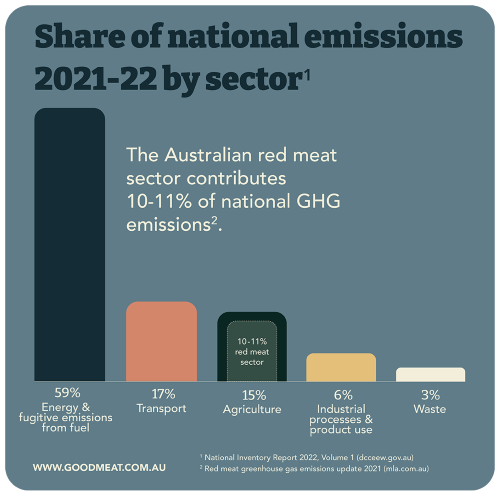The red meat industry contributes 10-11% of national GHG emissions
Emissions by industry
According to the Australian Government National Inventory Report 2022, the major sources of national emissions (excl Land Use, Land-Use Change and Forestry (LULUCF)) are energy (58.9%), transport (17.2%), and agriculture (14.9%).1
If red meat were its own category, it would contribute 10-11% of national greenhouse gas emissions.2

Emissions by gas
Carbon dioxide emissions make up 73% of Australia’s national emissions, followed by methane (20.8%) and nitrous oxide (3.2%)1
The Australian red meat sector contributes extremely low volumes of long-lived carbon dioxide emissions compared to the energy sector. However, agriculture is the primary source of methane emissions in Australia – with methane from livestock making up two-thirds of agriculture’s methane footprint.
Methane is a natural by-product of livestock digestion, and so the industry has an important role to play in reducing emissions while still providing essential nutrition those who enjoy our product.
Graziers are custodians of almost 50% of Australia’s land mass. To that end, the red meat sector is one of the few industries with potential to sequester volumes of carbon, increase carbon storage in the landscape and manage for biodiversity and healthy waterways.
The red meat industry is exploring methods to reduce its GHG footprint, both by directly reducing emissions and increasing the volume of carbon stored as soil carbon or in beneficial vegetation.
Modelling conducted by lead scientists at CSIRO show that with novel technologies and best practice, the red meat industry can reduce its footprint by over 80% by 2030.
2 B.CCH.2124 - 2021 Greenhouse gas footprint of the red meat industry


